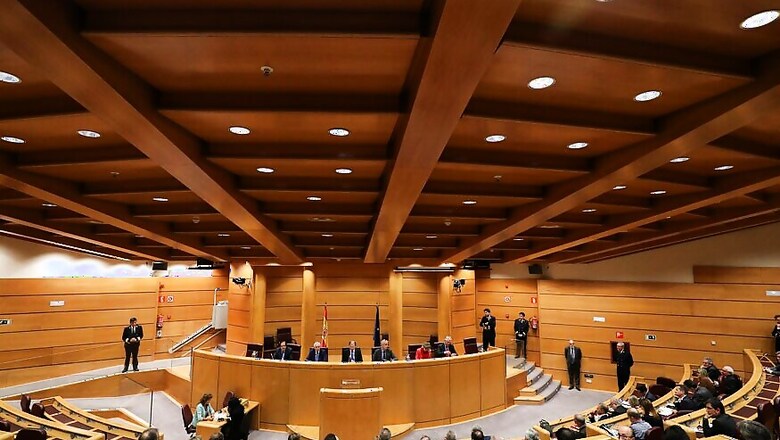
views
Madrid: Secessionist leaders in Catalonia may call a snap election in an attempt to break the deadlock with Madrid over independence, a senior local politician said on Tuesday, but Spanish authorities made clear that would not be enough.
Spain says it will impose direct rule on Catalonia from Friday to prevent an illegal push for independence, invoking unprecedented powers to dismiss the regional government. The Madrid government said an election would not change those plans.
The Catalan parliament meets on Thursday to agree on a response to Madrid, and many analysts believe the economically powerful region could formally declare independence.
Secessionists in Catalonia say their independence referendum on Oct. 1 - which attracted a 43 percent turnout and was mostly boycotted by Catalans who want to remain in Spain - has given them a mandate for statehood.
Catalonia said on Monday it was confident that its officials, including the police, would defy attempts by Madrid to enforce direct rule.
Spanish political and business leaders, along with most Catalonian newspapers, have urged Catalan President Carles Puigdemont to call a regional election before he is stripped of his authority.
They say direct rule from Madrid would be a humiliation for Catalonia and pose a serious risk of unrest.
Puigdemont has so far remained silent on the matter of an election but an ally of his pro-independence government said he was actively considering this option.
"We have evidence this is currently on the table," Carles Riera, a Catalan lawmaker for the anti-capitalist CUP party, told a news conference.
Calling an election would be a face-saving move for Puigdemont as it could either strengthen his mandate if pro-independence parties won or allow him a graceful exit if they did not.
DEBATE?
The Spanish government said a snap election would be a first step but Puigdemont would also have to withdraw an ambiguous declaration of independence he made earlier this month.
The government had moved to cancel Catalonia's autonomous status because it believed there had been a "serious failure" by Puigdemont to meet his obligations, Justice Minister Rafael Catala said in a radio interview.
"Everything is not fixed just by calling an election."
Catala said that if Puigdemont appeared before the Spanish Senate, it would help attempts to find a solution to the crisis.
A top official in the Senate said that if Puigdemont decided to appear before the house, Prime Minister Mariano Rajoy would likely come to the chamber as well so that a proper debate could be organised between the two.
The Madrid government has so far refused to meet the Catalan leader until he drops his call for independence and Catala said any appearance by Puigdemont had to be within a legal and constitutional framework.
"If his appearance is within the constitution and the law we'll be delighted ... But if it's just to ratify his position on Catalonia's independence, sadly we will not be able to do anything else than continuing with the measures already set by the government," Catala said.
The political uncertainty has taken its toll on Spain's wealthiest region, with hundreds of companies moving their headquarters out of Catalonia.
Volkswagen's Spanish unit SEAT, one of the biggest employers in the region, said it would move its registered office if it felt there was no longer legal security in Catalonia, although it had so far not made a decision.
"Relocating the registered office would respond to the need to seek legal protection, and would make sense the moment we felt it was no longer afforded in the territory where we are located," SEAT Executive Committee Chairman Luca de Meo said in a letter to the company's more than 14,000 employees in the region.


















Comments
0 comment